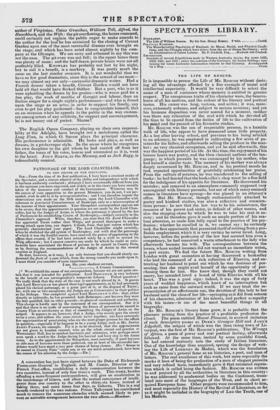THE LIFE OF ROSCOE.
IT is impossible to peruse the Life of Mr. Roscos without (Teri*, ing all the advantage afforded by a fine example of moral arid intellectual superiority. It would be very difficult to select the name of a man of eminence whose memory is entitled to greater respect. The conspicuous traits of his character were, the benevo- lence of all his motives, and the ardour of his literary and poetical tastes. His career was long, various, and active; it was, more- over, extremely arduous, and subject to serious reverses; and yet his humane disposition was never soured for a moment, neither was there any relaxation of the zeal with which he devoted all the time to be spared from the duties of life to the cultivation of his mind and the pursuit of his favourite studies.
Mr. RoscoE was the son of respectable persons, in a humble walk of life, who appear to have possessed some little property. As a boy after leaving school, and previous to his being articled to an attorney, lie was employed in cultivating a few acres of po- tatoes for his father, and afterwards selling the produce in the mar- ket : no very classical occupation, and yet he said afterwards, this was the happiest period of his life. At this time, the enjoyment of his leisure hours was poetry, and the then classical authors of the lan- guage; in which pursuits he was encouraged by his mother, who had herself a similar taste. The memory of his mother was always deeply reverenced by Mr. RoscoE, and in his poetical moods he took repeated opportunities of gratefully celebrating her praise. From the culture of potatoes, be was transferred to the selling of books : lie had fancied that the bookseller's shop must be a fine field for the indulgence of his appetite for literature. He discovered his mistake; and removed to an atmosphere commonly supposed very uncongenial with literary pursuits, but out of which many eminent names in literature have sprung—he was placed in an attorney's office. But Mr. ROSCOE, though enthusiastically attached to poetry and kindred studies, was also a reflective and conscien- tious person : he saw, that the law was to be his subsistence, the resource of his parent and sister, in default of other means, and also the stepping-stone by which he was to take his seat in so- ciety; and he therefore gave it such an ample portion of his zea- lous attention, as made him fully equal to the practice of his pro-' fession : whether he excelled in it, we cannot say : he certainly took the first opportunity that presented itself of retiring from a pro- fitable employment, which it is very certain he never loved. Long, however, before the profession of the law had secured him even a competency, he had conceived a warm attachment to the lady who- afterwards became his wife. The correspondence between the lovers, whose united incomes did not warrant an immediate union, in part exists. We find the future Mrs. ROSCOE writing from London with great animation at having discovered a bookseller who bad the command of a rich collection of Elzevirs, and en- treating her husband to point out which he was desirous of pos- sessing, that she might avail herself of the opportunity of pur- chasing them for him. She knew that, though they could not marry, her intended loved a brood of little Elzevirs with all his heart. This was a good sign: indeed, it was the sign of forty years of wedded happiness, which knew of no interruption but such as came from the outward world. If we may trust the re- presentation of an affectionate son, the devotion of this lady to her husband until the close of her life—springing as it did from esteem of his character, admiration of his talents, and perfect sympathy with his tastes—is one of the most beautiful things in all biography. As Mr. ROSCOE'S literary fame grew, it is probable that the pleasure arising from the practice of a profitable profession de- clined. The poem entitled Mount Pleasant, in avowed imitation of such descriptive poems as DYER'S Grongar Hill and JAGO'S Edg,ehill, the subject of which was the then rising town of Li- verpool, was the first of Mr. ROSCOE'S publications. The Wrongs of Africa, a poem of power and real poetical feeling, afterwards followed. At the same time, incited by some youthful friend, he bad entered zealously into the study of Italian literature.
Out of the knowledge thus acquired, sprung the design of writ- ing the Life of LORENZO de Medici, which was the foundation of Mr. ROSCOE'S general fame as an historian, a poet, and man of letters. The real excellence of this work, but more especially the marks it bore of being the production of a man of elegant pursuits and very refined taste, immediately gave it that animated reputa- tion which is called being the fashion. Mr. ROSCOE was written to and praised by all the authorities in literature in this country: he was addressed by academical bodies on the Continent, trans- lated into most of the languages of the West, and in short ac- quired European fame. Other projects were recommended to him, and most especially the History of the Revival of Literature, so far as it might be included in the biography of LEO the Tenth, one of his Medicis.


















 Previous page
Previous page